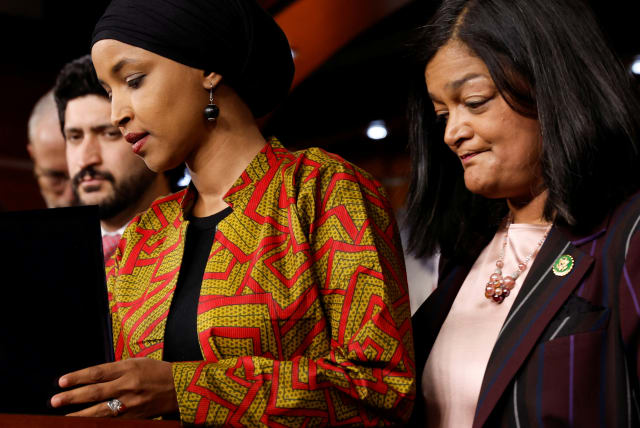How can Jews fight progressive antisemitism? - opinion

A professor told me that the “Jew with the violin” is endearing, but the Jew with the rifle is “not my type of Jew.”
This may sound counter-intuitive and perhaps even mad, but if you want to combat Jew-hatred in progressive spaces, don’t fight the antisemitism, fight the progressivism. To explain this wild idea, it may be helpful to examine language found in the description of the recently launched Institute for the Critical Study of Zionism (ICSZ), which aims “to support the delinking of the study of Zionism from Jewish Studies, and to reclaim academia and public discourse for the study of Zionism as a political, ideological, and racial and gendered knowledge project, intersecting with Palestine and decolonial studies, critical terrorism studies, settler colonial studies, and related scholarship and activism.”
In sum, architects of this declaration seek to primarily divorce Zionism from Jewish identity and secondarily, position Zionism outside of the pale of progressive ideology.
For founders of ICSZ, the world is understood as a battlefield between two major forces: those who have political power and those who are politically powerless. For example, the white man, simply because of his skin color has inherited a privilege, a certain power, in society and exerts this power simply by existing.
Examine closely the sacred categories to be studied by this institute: race, gender, and colonization. Each exists within a binary framework of power and powerlessness. If one accepts such a framework, naturally Zionism must be confronted and eradicated. Why? Because at its core, Zionism is a Jewish national movement that seeks to restore a land to a certain ethnic group. Zionism is the antidote to victimhood; moreover, it is the return of agency to a persecuted people. As such, if you are a progressive, Zionism makes you uncomfortable.
Of course, there are those who view Zionism as an apotheosis of social justice, who bemoan the attempt to paint Zionist Jews as politically conservative. For these individuals, who identify as progressive, Jews matter because they are a marginalized people who deserve self-determination and freedom from persecution.
Unfortunately, progressivism has a great response to this point, which in many ways is a contradiction to being progressive and a Zionist: in a hierarchy of marginalization, Jews are near the bottom. We don’t get to be free from persecution at the cost of a higher ranked “persecuted” minority: the Palestinian Arabs.
Jew with the violin
It reminds me of a conversation I had with a professor who told me that the “Jew with the violin” is endearing, but the Jew with the rifle is “not my type of Jew.” He was not wrong: that Jew with the rifle is the Zionist Jew as evidenced by a poster of the Irgun, a Zionist paramilitary organization that operated in British Mandate Palestine between 1931 and 1948.
Progressives are likewise not wrong to view Zionists as having political might. Zionism is the reconstitution of dignity – the return of the Jewish people to history; to no longer be its objects, but history’s rightful subjects. Israel is a militarily, economically, and politically powerful country. What they are, however, terribly wrong about is identifying Zionism as a form of racism and settler-colonialism.
So what are we to do? How to combat the vilification of Zionism that stems from the political left? Strategies to combat Jew-hatred are diverse. One vivid and recent example comes from Jewish advocacy groups who, in an attempt to oppose the highly problematic Ethnic Studies model curriculum in California advocated to insert a unit on Jews as a persecuted minority; another strategy was to insert a unit on Jews of color, thus hedging their bet to join the intersectional alliance.
The obvious question, it would seem, would be to ask these Jewish advocates: do you really want to matter because you are a persecuted minority? What about that Jew with the rifle? Where exactly does this Jew belong?
Other strategies to combat anti-Zionism include demonstrating that Jews are the indigenous people of the Land of Israel, thus opposing the claim that Zionism is a form of settler-colonialism. The logic here being, a group of people who are indigenous cannot be colonists. While this is true, that is, that Jews are very much the indigenous people of Israel, it reinforces the progressive framework that power equals guilt.
A third dominant strategy is to influence Diversity Equity and Inclusion (DEI) programs in universities, hoping that in the mandated anti-racism and anti-discrimination trainings, DEI officers would include the long-suffering Jews. But as Tammi Rossman-Benjamin, founder of AMCHA recently writes, “it turns out there are numerous problems involved in trying to address antisemitism within a DEI framework... as a practical matter, DEI programs limit their ‘equity’ and ‘inclusion’ efforts to certain identity groups, which rarely include Jews.”
Focusing predominately on marginalized groups, DEI programs are not equipped to deal with the fact that for American Jews, “this is no longer the case.” DEI frameworks necessitate a worldview in which only marginalized people matter. By extension, Zionists, who are Jews with power, not only do not matter but must be dealt with opprobrium. This is not an opinion. It is a fact. In December 2021, the Heritage Foundation published a troublesome finding in which DEI staff harbor antisemitic views toward Israel and Zionism.
What, then, is the solution? At the forefront of this battle is the Institute for Jewish Liberal Values, founded by David Bernstein, whose 2022 book Woke Antisemitism: How a Progressive Ideology Harms Jews documents how the sweeping ideology of progressivism has given fertile ground for contemporary Jew-hatred, anti-Zionism, to flourish. Identifying a correlation between progressive ideology and antisemitism, Bernstein’s important work sheds light on how and why Zionism is perceived to be racism as progressive ideologues espouse the notion that people with power can be racists.
Naturally, the solution would be to disprove that Jews are privileged, or rather prove that they are beleaguered. But we are not. In numbers alone, we are, indeed, a minority. But we are successful; moreover, Zionism is the realization of the Jewish people’s will to take its rightful place among the nations: to establish secure political borders under the aegis of self-determination.
As Ze’ev Jabotinsky, a Revisionist Zionist leader and military commander of the Irgun, said in 1937, “Tell them [the Jewish People] three things in my name, and not two: they must get iron [i.e. weapons]; they must choose a king; and they must learn to laugh.” We are to read this statement as an extension of self-determination. This is Zionism: the Jew with the weapon who is a sovereign. This, however, is also entirely unpalatable to progressivism.
It would seem, therefore, that in order to fight the antisemitism emanating from progressivism, one needs to oppose the ideology that births this iniquity. For perspective, it is akin to fighting antisemitism that stems from Nazism but not the Nazism ideology itself. Nazism was evil not just for the Jews but for any human who accepted a world view in which race determined hierarchy. Likewise, progressivism does not harm solely the Jew; it is unhealthy for civilization to pit people against one another simply because one has more privilege or power than another.
To confront the antisemitism weaved into the ethnic studies curriculum, for example, by proving that Jews matter as a persecuted minority, does not benefit Jewish identity; more importantly, it reinforces a crooked worldview in which the West is collectively evil, Zionism is racism, and Israel is a settler-colonial state.
I observe the many Jewish advocates, both social media influencers and nonprofit groups, post endlessly about how inclusive, democratic, racially diverse, and equitable Israel is. But no amount of pride parades, medical innovations, or technological advances to benefit the environment will clear the Zionist of the guilt of power:
The strategy, therefore, must be to confront the ideology that breeds the antisemitism. This, of course, is no easy task, for progressivism is not only fashionable but dominates institutions of our society (e.g., education, media, journalism). It takes great courage to reject a model of the world that seeks to punish those with power; it takes great courage to refuse to punish people for the sin of privilege. It takes moral clarity to seek to not only oppose an ideology nurtured on Marxism but offer a different model.
This, then, is what we are called upon to do. To perceive the warning signs which emanate from antisemitism, for the Jew is the proverbial canary in the coal mine.
The writer was born in the former Soviet Union and came to the US with her family in 1989. She received her Ph.D. in Russian literature and wrote her dissertation on Holocaust literature in the Soviet Union. She is the education editor for White Rose Magazine, and a research fellow for the Institute for the Study of Global Antisemitism and Policy, as well as an educator specializing in teaching Jewish history, the Holocaust, and world literature.
Jerusalem Post Store
`; document.getElementById("linkPremium").innerHTML = cont; var divWithLink = document.getElementById("premium-link"); if (divWithLink !== null && divWithLink !== 'undefined') { divWithLink.style.border = "solid 1px #cb0f3e"; divWithLink.style.textAlign = "center"; divWithLink.style.marginBottom = "15px"; divWithLink.style.marginTop = "15px"; divWithLink.style.width = "100%"; divWithLink.style.backgroundColor = "#122952"; divWithLink.style.color = "#ffffff"; divWithLink.style.lineHeight = "1.5"; } } (function (v, i) { });

